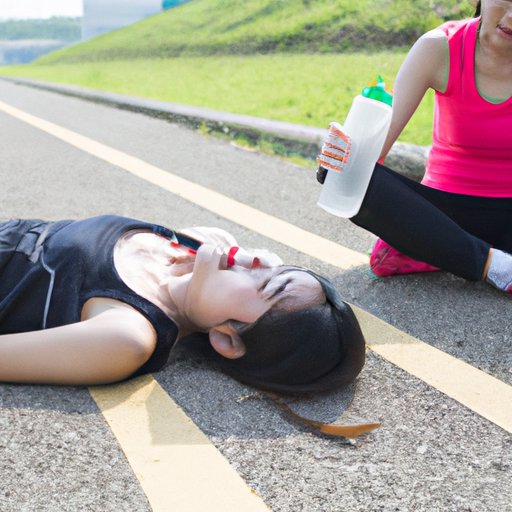Introduction
Passing out while exercising is a serious medical condition known as exercise-associated collapse (EAC). It can be caused by dehydration, extreme heat, low blood sugar, or overexertion. In some cases, it can even be life-threatening. Understanding how to prevent EAC is essential for anyone who exercises regularly.
Start Slowly
It’s important to start any workout routine at a gradual pace, especially if you’re new to exercise. According to a study published in the American Journal of Cardiology, “starting an exercise program with too much intensity or duration may increase the risk of exercise-related collapse.”
A good way to ease into a routine is to do low-intensity exercises such as walking or swimming. As you get used to these activities, you can gradually increase the intensity by running, biking, or lifting weights. This will help your body adapt to the increased exertion and make it less likely to pass out during exercise.
Stay Hydrated
Staying hydrated is essential for preventing EAC. A study published in the journal Clinical Medicine & Research found that dehydration is one of the leading causes of exercise-induced collapse. Therefore, it’s important to drink plenty of fluids before, during, and after exercising.
It’s also important to drink water throughout the day. Aim to drink at least 8 glasses of water per day. If you’re exercising for more than an hour, consider drinking a sports drink to replenish electrolytes. Additionally, avoid alcohol and caffeine, which can lead to dehydration.
Monitor Your Heart Rate
It’s important to monitor your heart rate while exercising. If your heart rate gets too high or too low, you are at a higher risk of passing out during exercise. According to a study published in the journal Sports Health, “individuals should strive to keep their heart rates within 50-85 percent of their maximum heart rate.”
To track your heart rate, you can use a heart rate monitor or a fitness tracker. These devices measure your heart rate and can alert you when it gets too high or too low. You can also manually check your heart rate by taking your pulse on your wrist or neck.
Eat Before Exercising
Eating a balanced meal an hour or two before exercising can help prevent passing out. Eating too close to exercise can cause blood sugar levels to drop, leading to dizziness and lightheadedness. According to a study published in the journal Nutrition Reviews, “low blood sugar associated with inadequate pre-exercise meals is a major risk factor for exercise-related collapse.”
If you don’t have time for a full meal, try eating a healthy snack such as a banana, granola bar, or handful of nuts. These snacks provide energy and help maintain stable blood sugar levels.
Wear Breathable Clothing
Wearing breathable clothing is essential for preventing EAC. Tight clothing can restrict airflow and make it harder to cool down during exercise. According to a study published in the journal Sports Medicine, “wearing lightweight and loose-fitting clothing can help reduce the risk of exercise-induced collapse.”
Look for fabrics that are lightweight and breathable, such as cotton or linen. Avoid synthetic fabrics such as nylon and polyester, which can trap heat and make it harder to cool down.
Take Breaks When Needed
If you start to feel faint or lightheaded during exercise, it’s important to take a break. Stop what you’re doing and sit down or lie down until you feel better. According to a study published in the journal Annals of Emergency Medicine, “stopping exercise immediately and lying down may help prevent further collapse.”
If possible, drink some water or eat a snack to raise your blood sugar level. Once you’re feeling better, you can resume your workout. However, if the symptoms persist, seek medical attention.
Conclusion
Passing out while exercising is a serious medical condition that can be prevented with proper precautions. Start any workout routine at a gradual pace and stay hydrated before, during, and after exercise. Additionally, monitor your heart rate and eat a balanced meal before exercising. Wear breathable clothing and take breaks when needed. By following these tips, you can help prevent passing out while exercising.
(Note: Is this article not meeting your expectations? Do you have knowledge or insights to share? Unlock new opportunities and expand your reach by joining our authors team. Click Registration to join us and share your expertise with our readers.)
